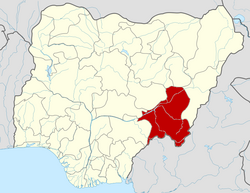Takum | |
|---|---|
LGA and town | |
| Nickname: TTM | |
| Motto: Together We are One | |
 | |
| Coordinates: 7°15′N9°59′E / 7.250°N 9.983°E | |
| Country | |
| State | Taraba State |
| Local Government Headquarters | Takum |
| Government | |
| • Chairman | Hon. Boyi Manja [CTC] |
| Area | |
• Total | 2,503 km2 (966 sq mi) |
| Population (2006 census) | |
• Total | 135,349 |
| Time zone | UTC+1 (WAT) |
| 3-digit postal code prefix | 671 |
| ISO 3166 code | NG.TA.TA |
 | |
GENESIS SANDA from Takum LGA
Takum is a Local Government Area of Taraba State, Nigeria. Its headquarters is the town of Takum, it was created out of Wukari local government in June 1976. Takum borders the Republic of Cameroon in the south, Ussa Local Government to the west, Donga Local Government to the north, District within Takum are Angwan Dutse, Angwa Abuja, Tikari, Fadama, Gahwetun, Akenten, Acha Nyim, Chanchanji (Peva), Sufa, Shimta, Kufi, Muji, Akenten, Lufu, Kashimbilla, Kpaasan, Likam, Bete, Malumshe, Jidu, Tampwa, Dumse, Nyayirim, Liji, Shibong Igbang, Barki Lissa, Acha Sarka, Sabon Gida Yukuben etc. Takum LGA is divided into eleven electoral wards namely: BETE, CHANCHANJI, DUTSE, FETE, GAHWETON, KASHIMBILA, MANYA, ROGO, SHIBONG, TIKARI, YUKUBEN [ citation needed ]
Contents
Major tribes are the Kuteb, Ichen, Kpanzon, Tiv, Chamba, Uhumkhigi and Hausa.[ citation needed ] Takum is under the Traditional leadership of the Ukwe Takum dating back to the 16th century.
The postal code of the area is 671. [1]
